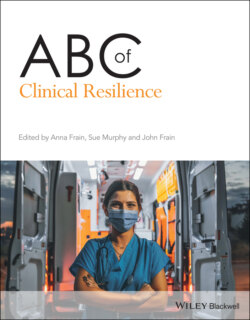Читать книгу ABC of Clinical Resilience - Группа авторов - Страница 6
Preface
Оглавление‘To err is human’ but so is to excel. Resilience recognises this. It is about bouncing back, regaining our shape – about not merely carrying on, but becoming more self‐aware rather than more self‐critical. Clinical resilience is not about standing apart from our patients but embracing the humanity we share and planning for the physical, emotional and cognitive effects our work has upon us. Our work is intense, and it is a paradox of modern healthcare systems that, despite the incredible treatment pathways and technological advances we have achieved, our most precious resource – those who deliver the care – report feeling increasingly burned out and unable to carry on.
We are human beings trying to help other human beings. Our professional role often requires us to be bigger than who we believe we are capable of being. When we fall short of this self‐imposed expectation, many of us feel we have failed, that we have let ourselves down as well as our patients and our colleagues. Though we must be aware of our limitations, we should not be bound by them.
A recurring theme of this book is the need in healthcare for greater kindness. Not kindness as simply an emotional feeling – important though this is – but intelligent kindness, the kindness that motivates us to be cooperative rather than competitive with one another; to feel connected, thoughtful and with a sense of kinship towards other people. This connectedness starts with thoughtfulness towards ourselves, and learning about the impact on our physiology and our cognitive performance of the stressful environments in which we are all working. The potential gains are substantial. First, there is our own well‐being, and a recovery of that ‘joy of practice’ which first alerted us to the attraction and fulfilment of working in healthcare. Secondly, greater safety and well‐being of staff means improved safety for patients and a reduction in the medical error related to staff burnout. There is a particular responsibility on healthcare regulators, leaders and providers to develop the intelligent kindness towards healthcare staff which has too often been absent, so that staff and their patients remain safe.
We are grateful for the contribution of our authors, all of whom committed to this project before the outset of the Covid‐19 pandemic, an event which has bought into much sharper focus so many of the themes we set out to explore in this book. They have shown resilience in completing their chapters in such a timely way despite the challenging circumstances. We work in Canada and the UK, and so this book inevitably reflects perspectives on resilience in our particular countries. However, from our professional conversations, we believe the themes we have explored reflect concerns in many countries and health systems worldwide.
We hope the individual reader will find this book of interest. With our emerging understanding of resilience and its importance to patient care, training programmes are increasingly considering how to incorporate resilience into healthcare education. We hope our work will be helpful to them as well.
Anna Frain
Sue Murphy
John Frain
February 2021
